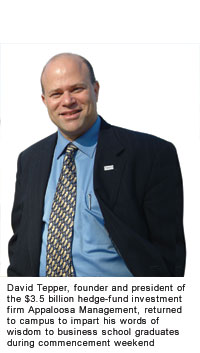On Wall Street, when David Tepper talks, people listen. So when the founder and president of Appaloosa Management, a $3.5 billion hedge-fund investment firm, returned to campus to impart his words of wisdom to business school graduates during commencement weekend, all eyes and ears were intently focused on the Pittsburgh native whose $55 million gift to the university in 2004 renamed the business school the David A. Tepper School of Business.

“The road to success is full of bumps and curves. [But] when I graduated from the business school here, I didn’t know how fast those bumps would come,” said David Tepper, who earned his MBA from Carnegie Mellon in 1982.
As graduates hung on his every word, Tepper talked about how he navigated those bumps to become one of Wall Street’s major players, and what he’s learned along the way.
After earning his MBA, Tepper went to work in the finance department of Republic Steel in Ohio and just two months later incurred his first bump in the road when the company announced a seven percent pay cut across the board. The news made the front page of The Wall Street Journal. “More than a few of my classmates called to congratulate me on my fine choice of employer,” he recalled.
He soon left Republic Steel for a brief stint with Keystone Mutual Funds, now part of Evergreen Funds in Boston, where he earned a reputation as one of the best and toughest credit analysts in the region. Goldman Sachs in New York City recruited him in 1985 and after six months he got the chance to become a trader. It was a curve he handled quite well.
“While learning how to trade I realized that the models corporate bond traders used were wrong,” Tepper says. “I thought that junk bonds should not trade by maturity like high-grade corporates, but should trade by industry sectors like stocks.”
Tepper led a model change at the firm and in six months became Goldman Sachs’ head trader on the high-yield desk. But another bump, or two, or three, was forthcoming. Three times he failed to be voted a partner of the firm. The reason: office politics.
In 1993, Tepper left Goldman Sachs to launch Appaloosa Management, which specializes in credit markets and invests in stocks, bonds and companies around the world. While the company is one of Wall Street’s top performers—it has averaged a 34 percent annual return for its investors— there have also been a few curves, he says, citing downturns in the market in 1998 and 2002. However, despite several blips on the financial radar screen, $1 invested with his firm in 1993 would be worth $16 today.
Tepper closed by sharing the top six career lessons he’s learned with his new group of fellow alumni.
- Experience is more important than money in the early part of one’s career.
- Don’t always trust the models—question them no matter how smart or famous the people are who created them.
- Remember that interpersonal relations are important. Keep an open mind and be respectful of others.
- Don’t be afraid to take chances. You can always land another job or start another business. The biggest risk you may take is not taking the appropriate risks.
- Love what you do. It makes every day rewarding.
- Balance your life. Remember who you are and where you came from. If you’re a vegetarian, be a vegetarian. Don’t forget your parents’ anniversary, your kids’ birthdays. And don’t miss your sons’ or daughters’ little league baseball or soccer games.
While commencement was a milestone for more than 2,100 Carnegie Mellon graduates, it was also somewhat of a personal milestone for Tepper, who arrived in Pittsburgh late Friday night.
“I realized upon my arrival that I had lost one of my dress shoes in the airport. There was only one store open late at night, and today I am wearing my first-ever pair of Wal-Mart dress shoes, which I purchased for $19.95.”
Related Links:
Tepper School of Business
Wall Street Wizard Makes Record-Breaking $55 Million Gift



